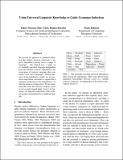Using Universal Linguistic Knowledge to Guide Grammar Induction
Author(s)
Naseem, Tahira; Chen, Harr; Barzilay, Regina; Johnson, Mark
DownloadBarzilay_Using universal.pdf (210.0Kb)
OPEN_ACCESS_POLICY
Open Access Policy
Creative Commons Attribution-Noncommercial-Share Alike
Terms of use
Metadata
Show full item recordAbstract
We present an approach to grammar induction
that utilizes syntactic universals to improve
dependency parsing across a range of
languages. Our method uses a single set
of manually-specified language-independent
rules that identify syntactic dependencies between
pairs of syntactic categories that commonly
occur across languages. During inference
of the probabilistic model, we use posterior
expectation constraints to require that a
minimum proportion of the dependencies we
infer be instances of these rules. We also automatically
refine the syntactic categories given
in our coarsely tagged input. Across six languages
our approach outperforms state-of-the-art
unsupervised methods by a significant margin.
Description
URL to papers list on conference site
Date issued
2010-10Department
Massachusetts Institute of Technology. Computer Science and Artificial Intelligence Laboratory; Massachusetts Institute of Technology. Department of Electrical Engineering and Computer ScienceJournal
Proceedings of EMNLP 2010: Conference on Empirical Methods in Natural Language Processing
Citation
Naseem, Tahira et al. "Using Universal Linguistic Knowledge to Guide Grammar Induction." Proceedings of EMNLP 2010: Conference on Empirical Methods in Natural Language Processing, October 9-11, 2010, MIT, Massachusetts, USA.
Version: Author's final manuscript